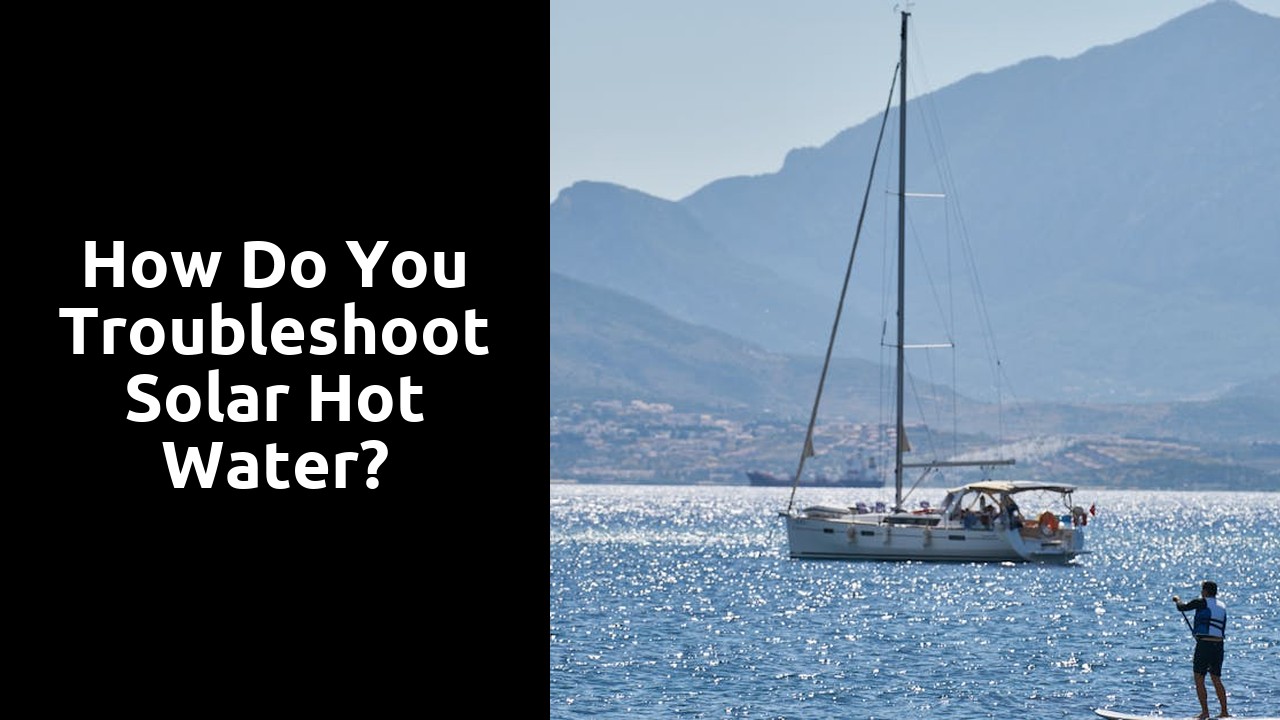
Table Of Contents
Reviewing the Backup Heating Element
Reviewing the Backup Heating Element
When troubleshooting issues with your solar hot water system, it is essential to assess the functionality of the backup heating element. The backup heating element serves as a vital component in ensuring a consistent supply of hot water, especially during periods of low sunlight or high demand. Begin by checking the power supply to the backup heating element to verify if it is receiving electricity. If the power source is confirmed to be functioning correctly, proceed to investigate if there are any visible signs of damage or corrosion on the heating element itself. Regular maintenance and inspection of this component are crucial to prevent disruptions in the heating process and to maintain the efficiency of your solar hot water system.
Ensuring Proper Functioning of Backup Heating in the System
To address issues with the backup heating element in your solar water heater, it is crucial to investigate the functionality of this component thoroughly. Begin by checking the power supply to the backup heating system to ensure it is receiving electricity appropriately. Assessing whether the backup heating element is getting power can help identify if the cause of the problem lies in an electrical issue. If the backup heating element appears to be properly connected and powered, but the water is still not heating up, it might be necessary to replace the backup heating element.
Conducting regular maintenance checks on the backup heating element of your solar hot water system is essential to prevent unexpected breakdowns. Inspecting the backup heating element periodically can help detect any signs of wear and tear early on, allowing for prompt repairs or replacements. By staying proactive in maintaining the backup heating component, you can ensure the continuous and efficient operation of your solar hot water system. Solar Hot Water System Troubleshooting is essential for identifying and resolving potential issues with the backup heating element to enjoy a reliable and consistent supply of hot water.
Considering the Water Quality
Considering the water quality is essential when troubleshooting your solar hot water system. The presence of hard water in the system can lead to mineral deposits that hinder the efficiency of the heating elements. Installing a water softener can help mitigate these issues and improve the overall performance of your solar water heater. By addressing the water quality, you can ensure that your system operates at its optimal level and provides you with hot water as expected. Solar hot water system troubleshooting involves looking into various factors that can affect its functionality, and water quality is a critical aspect to consider.
Ensuring that the water quality is appropriate for your solar hot water system is important for its efficient operation. Hard water can lead to mineral buildup in the system, reducing its effectiveness in heating the water. By installing a water softener, you can prevent these deposits from forming and improve the overall performance of your solar water heater. Remember that addressing the issue of water quality is a crucial step in troubleshooting your solar hot water system and can help you maintain consistent hot water supply throughout the year.
Installing a Water Softener for Improved Performance
Water softeners play a crucial role in enhancing the performance of solar hot water systems. Hard water contains minerals such as calcium and magnesium, which can accumulate in the system over time, leading to reduced efficiency. By installing a water softener, these minerals can be mitigated, allowing the system to operate at its optimal capacity. This is particularly important for solar water heaters as any obstructions in the system can hinder the transfer of heat and impact the overall heating process. Thus, investing in a water softener can alleviate these concerns and ensure that the system functions efficiently.
Moreover, water softeners help prolong the lifespan of solar hot water systems by preventing mineral buildup and corrosion within the system. The softer water produced by the softener is gentler on the components of the system, reducing the risk of damage and the need for costly repairs. By incorporating a water softener into the maintenance routine of your solar hot water system, you can not only improve its performance but also extend its longevity. For an uninterrupted flow of hot water in your household, considering the installation of a water softener is an essential step in Solar Hot Water System Troubleshooting.
Assessing the System Pressure
Assessing the System Pressure
When troubleshooting your solar hot water system, checking the system pressure is crucial in determining its efficiency. Inadequate pressure can lead to a lack of hot water production, impacting the system's overall performance. It's essential to ensure that the pressure valves are adjusted correctly to allow for adequate flow within the system.
Monitoring the pressure gauge regularly can help identify any fluctuations that may affect the water heating process. Low pressure can be a result of various issues within the system, such as airlocks or blockages. By assessing and adjusting the system pressure, you can help maintain optimal conditions for your solar hot water system to function efficiently and provide you with hot water whenever needed.
Adjusting Pressure Valves for Adequate Flow
When facing issues with your solar hot water system, one crucial aspect to consider is the system pressure. Proper system pressure ensures the adequate flow of hot water through your system. Adjusting pressure valves can help regulate the flow and enhance the overall performance of your solar hot water heater. It is essential to ensure that the pressure valves are set at the appropriate levels to maintain an optimal flow of hot water throughout the system.
Monitoring the system pressure regularly can prevent disruptions in the flow of hot water. Adjusting the pressure valves for adequate flow is a simple yet effective way to troubleshoot your solar hot water system. By maintaining the correct pressure levels, you can ensure that your system functions efficiently, providing you with a reliable source of hot water.
FAQS
What could be the reason for my solar water heater not providing hot water?
There could be multiple reasons for your solar water heater not giving hot water, such as issues with the backup heating element, water quality, or system pressure.
How can I check if the backup heating element in my solar water heater is functioning properly?
You can review the backup heating element by ensuring it is powered on, checking for any visible damage or corrosion, and testing its functionality using a multimeter.
Will the water quality affect the performance of my solar water heater?
Yes, poor water quality can impact the efficiency of your solar water heater by causing mineral buildup or corrosion. Installing a water softener can help improve its performance.
How can I improve the performance of my solar water heater if I have hard water?
Installing a water softener can help reduce the mineral content in the water, preventing scale buildup in the solar water heater and improving its overall performance.
What should I do if the system pressure in my solar water heater is too low?
If the system pressure is too low in your solar water heater, consider adjusting the pressure valves to ensure adequate flow and optimal performance.
